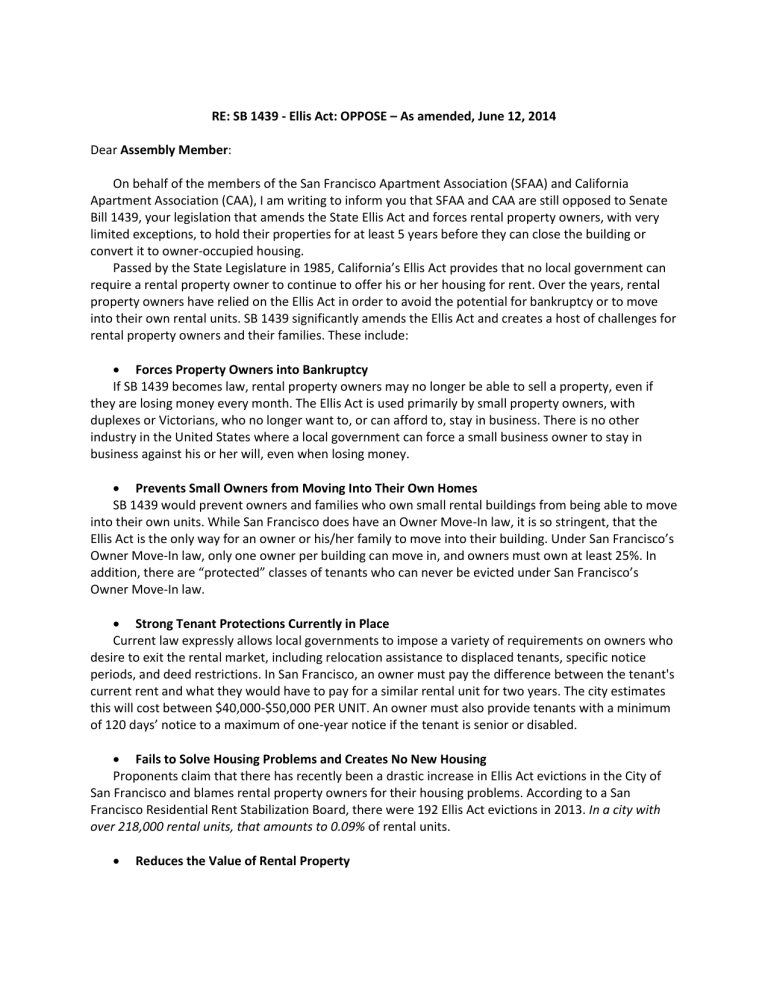RE: SB 1439 - Ellis Act: OPPOSE – As amended, June 12, 2014

RE: SB 1439 - Ellis Act: OPPOSE – As amended, June 12, 2014
Dear Assembly Member:
On behalf of the members of the San Francisco Apartment Association (SFAA) and California
Apartment Association (CAA), I am writing to inform you that SFAA and CAA are still opposed to Senate
Bill 1439, your legislation that amends the State Ellis Act and forces rental property owners, with very limited exceptions, to hold their properties for at least 5 years before they can close the building or convert it to owner-occupied housing.
Passed by the State Legislature in 1985, California’s Ellis Act provides that no local government can require a rental property owner to continue to offer his or her housing for rent. Over the years, rental property owners have relied on the Ellis Act in order to avoid the potential for bankruptcy or to move into their own rental units. SB 1439 significantly amends the Ellis Act and creates a host of challenges for rental property owners and their families. These include:
Forces Property Owners into Bankruptcy
If SB 1439 becomes law, rental property owners may no longer be able to sell a property, even if they are losing money every month. The Ellis Act is used primarily by small property owners, with duplexes or Victorians, who no longer want to, or can afford to, stay in business. There is no other industry in the United States where a local government can force a small business owner to stay in business against his or her will, even when losing money.
Prevents Small Owners from Moving Into Their Own Homes
SB 1439 would prevent owners and families who own small rental buildings from being able to move into their own units. While San Francisco does have an Owner Move-In law, it is so stringent, that the
Ellis Act is the only way for an owner or his/her family to move into their building. Under San Francisco’s
Owner Move-In law, only one owner per building can move in, and owners must own at least 25%. In addition, there are “protected” classes of tenants who can never be evicted under San Francisco’s
Owner Move-In law.
Strong Tenant Protections Currently in Place
Current law expressly allows local governments to impose a variety of requirements on owners who desire to exit the rental market, including relocation assistance to displaced tenants, specific notice periods, and deed restrictions. In San Francisco, an owner must pay the difference between the tenant's current rent and what they would have to pay for a similar rental unit for two years. The city estimates this will cost between $40,000‐$50,000 PER UNIT. An owner must also provide tenants with a minimum of 120 days’ notice to a maximum of one-year notice if the tenant is senior or disabled.
Fails to Solve Housing Problems and Creates No New Housing
Proponents claim that there has recently been a drastic increase in Ellis Act evictions in the City of
San Francisco and blames rental property owners for their housing problems. According to a San
Francisco Residential Rent Stabilization Board, there were 192 Ellis Act evictions in 2013. In a city with
over 218,000 rental units, that amounts to 0.09% of rental units.
Reduces the Value of Rental Property
By limiting the ability of owners and buyers to sell or convert their properties, SB 1439 significantly reduces the value and marketability of a property. Potential buyers who seek to purchase a 2 or 3 unit
Victorian and combine units for a home will not buy a property they can’t move into or convert. As a result, an existing owner must continue to lose money each month with reduced options to sell. The bill would create significant disincentives to ownership and investment in smaller rental properties.
Changes Rules on Owners who Purchased Within the Last 5 Years
SB 1439 retroactively applies to property owners who purchased their property within the last 5 years. These owners bought a property with the understanding of the current laws at the time. If owners knew that State law would change to drastically affect the value and usability of the property, it’s likely that many of them would not have purchased the property. Retroactively changing the rules of property ownership unfairly punishes those who risked their life-savings to purchase a property.
Amendments Fail to Address Concerns Of Small Property Owners
Proposed amendments to SB 1439 exempt a “natural person” who owns no more than two properties and who owns a total of no more than four residential units. The amendments fail to address any of the concerns of small property owners. The majority of small property owners own their properties through family trusts, partnerships, or corporations for various legal and tax purposes. Given the significant liability issues that arise from owning rental property, owners of all sizes are strongly
advised by legal counsel to own their properties through a trust or limited liability corporation. They are still very much “natural” people who own small rental properties. Under SB 1439, the majority of small owners would NOT be exempted and would be forced to stay in the rental business and would be prohibited from moving into their own units.
The amendment to SB 1439 that limits the exemption to ownership of no more than two properties and four units is arbitrary. A property owner in San Francisco who owns two other properties anywhere in the state or nation would not be exempted. There is no difference between an owner who owns two properties and one who owns three or four properties. Similarly, owners who own five, six, or seven total units are not generally in the rental housing business full-time and are considered small property owners. Using these arbitrary requirements unfairly penalizes similarly situated property owners.
The new amendments will severely discourage people from building or purchasing more property in
San Francisco or elsewhere in the State. An owner in San Francisco who already owns four units would not buy or build more property anywhere in California, knowing that they would then be subjected to the onerous requirements of SB 1439. For a city that clearly needs to build and encourage more housing,
SB 1439 does the opposite and will only further exacerbate the city’s housing production issues.
While SFAA and CAA not promote the elimination of rental housing, owners must be given equitable opportunities and solutions to exit the rental market, particularly in jurisdictions where local laws have become overly burdensome to the point that they make it difficult for owners to operate effectively. We stand ready to work with advocates to find ways to encourage more rental housing opportunities instead of misguided approaches that do nothing to create more housing.
The California Apartment Association is the largest rental housing trade organization in the country, representing more than 50,000 owners and operators who are responsible for more than 2 million rental units.




